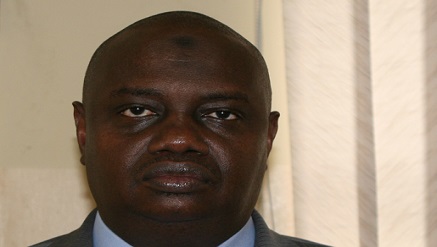News
Prolonged Battle against Cybercrime

Cybercrime is an image nightmare for Nigeria. Cybercrime is any illegal activity that uses a computer as its primary means and also includes any illegal activity that uses a computer for the storage of evidence.
Cybercrimes include crimes that have been made possible by computers, such as network intrusions and the dissemination of computer viruses, as well as computer-based variations of existing crimes, such as identity theft, stalking, bullying and terrorism.
But in Nigeria, the most common ones are: identity theft, desktop counterfeiting, cyber harassment and fraudulent electronic mails.
There are also Automated Teller Machine spoofing, pornography, piracy, hacking, phishing and spamming all conspiring to the notoriety of Nigeria as sanctuary for internet fraudsters.
The exceptional outbreak of cybercrimes in Nigeria is alarming, and the impact on the country’s socio-economy is damning.
That is why, the recently passed cybercrime bill by the Senate, which is now awaiting presidential endorsement is a welcome development.
It is victory of 10 years of efforts for a framework to safeguard the nation’s presence in cyberspace while ensuring protection of critical national information infrastructure.
The cybercrime bill, which was sponsored by Senator Adegbenga Kaka, representing Ogun East Senatorial Zone, among other things, stipulates a seven-year jail term for all kinds of computer-related frauds, computer-related forgery, offences relating to pornography, cyber-stalking and cyber-squatting.
The seven-year jail term was contained in a bill for an Act to provide for the prohibition, prevention, detection, response, investigation and prosecution of cybercrimes and for other related matters 2014.
The bill also seeks to punish interception of data, system interference and misuse of devices, and to promote cyber security, protection of computer systems and networks, electronic communications, data and computer programmes, intellectual property and privacy rights.
Also, anyone found guilty of possessing a manipulative device, unauthorised ATM card, damaging a computer with the intention to defraud, trafficking in any password to defraud customers or financial institutions would be sentenced to seven years imprisonment or a N7 million fine.
When the bill is signed into law, government must create lines of duty to avoid supremacy disagreements among law enforcement, intelligence and security agencies.
Also knowledgeable and committed champions who must stay ahead of criminals should be put in charge of cybercrime administration.
For the law succeed, there is also need for the enactment of substantive laws to criminalize malevolent activities on the internet; capacity building; cooperation between actors (Private or Public); establishment of Institutional framework for coordinating cybersecurity efforts; enactment of related Bills to strengthen the cybersecurity framework.
News
OAU Taps Aderounmu, Tech Advocate as DVC Academics

Obafemi Awolowo University (OAU), Ile-Ife, has appointed Professor Adesola Aderounmu, renowned computer scientist and technology advocate, as its new Deputy Vice-Chancellor (Academics).

Professor Adesola Aderounmu
The decision, made by the university’s Senate, marks a strategic step towards aligning OAU’s academic vision with technological innovation and global best practices.
A distinguished scholar and leader in Computer Science and Engineering, Professor Aderounmu brings decades of experience to this pivotal role.
He has served as the Centre Lead for the African Centre of Excellence in Software Engineering and the Obafemi Awolowo University Knowledge Park (OAK-Park), where he has driven initiatives that advance technological innovation and academic excellence.
His leadership journey includes serving as Dean of the Faculty of Technology and Head of the Department of Computer Science, as well as President of the Nigeria Computer Society from 2015 to 2019. Under his stewardship, the Africa Centre of Excellence in ICT (OAK-Park) was established and has flourished, positioning OAU as a hub for digital transformation in Nigeria and across Africa.
“This is an opportunity to shape the future of education at OAU,” Professor Aderounmu stated. “I am committed to fostering an environment where ideas thrive.”
Professor Aderounmu’s appointment as DVC Academics carries significant implications for the information technology profession and industry in Nigeria and Africa.
His leadership is expected to further bridge the gap between academia and industry, aligning curriculum with emerging technological trends, and fostering research that directly addresses the needs of Nigeria’s evolving digital economy.
His commitment to developing high-level ICT talent will contribute to strengthening the nation’s capacity in critical areas such as artificial intelligence, cybersecurity, software engineering, and digital entrepreneurship.
As Nigeria and Africa continue to embrace digital transformation, this appointment signals a continued push for collaboration between universities and the technology industry, ensuring that graduates are equipped with globally relevant skills while advancing innovative research that supports the tech ecosystem.
This appointment recognises Professor Aderounmu’s unwavering commitment to research, excellence in education, and visionary leadership, and marks a significant milestone in the university’s ongoing mission to deliver impactful education and innovation for national and continental development.
News
IviTrybe Hearts Takes Kindness Drive to Little Saints Home

In a heartwarming demonstration of corporate social responsibility and community impact, IviTrybe Hearts, a key initiative driven by members of IviTrybe – a vibrant group of budding marketing communications specialists – visited the Little Saints Orphanage, Akowonjo branch.

The visit, part of IviTrybe’s ongoing commitment to societal betterment, was significantly supported by Pladis Foods Nigeria, which generously donated gift items and products.
IviTrybe is a social responsibility initiative of IVI PR, a dynamic public relations agency dedicated to not only elevating brands but also fostering positive societal impact. This initiative provides focused practical training covering brand strategy and public relations, directly addressing the critical issue of insufficiently skilled manpower within Nigeria’s Public Relations industry. Through the #IviTrybeHearts program, the group channels its growing expertise into meaningful community engagement.
During the visit, the IviTrybe Hearts team dedicated the day to creating a memorable and impactful experience for the children. Activities included extensive bonding and interaction sessions, where members engaged in games and companionship, fostering an atmosphere of joy and connection. Essential items were donated to support the orphanage’s daily needs, and motivational talks were delivered, inspiring the children with words of encouragement and hope for their futures.
Busari Toheeb Dolapo, IviTrybe Coordinator and spokesperson for the project, underscored the essence of the visit, stating, “For whom much is given, much is expected. We have been empowered through knowledge and mentorship at IVI PR, and it’s only right that we channel that privilege into making a difference. The smiles on the children’s faces today reminded us why giving back is non-negotiable.”
The management of Little Saints Orphanage expressed profound gratitude for the support and the tangible impact of the donations, emphasising how such gestures significantly improve the lives and spirits of the children under their care.
Through impactful initiatives like IviTrybe Hearts, IviTrybe continues to exemplify how youth-led action, empowered by practical training and a strong sense of responsibility, can effectively shape communities and enrich lives for the better.
News
INTERPOL Report Shows Cybercrime is West, East African Most Dominant Security Concern

Cybercrime has emerged as a dominant security concern across Africa, with more than 30 percent of all reported crimes in Western and Eastern regions linked to cyber activity, according to the newly released 2025 Africa Cyberthreat Assessment Report by INTERPOL.

The report, based on data from African member states and private sector partners, reveals that two-thirds of surveyed countries describe cybercrime as constituting a medium to high share of total criminal cases.
This highlights how cyber-enabled criminal activity is evolving rapidly across the continent. The report identified alarming spikes in scam attempts, with some countries witnessing a 3,000 percent increase in suspected scam notifications in the past year.
Neal Jetton, INTERPOL’s Cyber Crime Director, warned that the threat landscape is evolving faster than enforcement responses.
“This fourth edition of the INTERPOL African Cyber Threat Assessment provides a vital snapshot of the current situation, informed by operational intelligence, extensive law enforcement engagement, and strategic private-sector collaboration.
“It paints a clear picture of a threat landscape in flux, with emerging dangers like AI-driven fraud that demand urgent attention. No single agency or country can face these challenges alone,” Jetton stated.
In the past year, suspected scam notifications rose by up to 3,000 per cent in some African countries, according to data from Kaspersky, one of several private sector partners that work with INTERPOL’s cybercrime directorate
Online scams, particularly through phishing, are the most frequently reported cybercrimes across the continent. Ransomware attacks and Business Email Compromise (BEC) incidents are also increasing, particularly in Nigeria, Kenya, South Africa, and Egypt.
“Ransomware detections in Africa also rose in 2024, with South Africa and Egypt suffering the highest number, at 17,849 and 12,281 detections respectively, according to data from Trend Micro, followed by other highly digitised economies such as Nigeria (3,459) and Kenya (3,030),” it stated.
Incidents included attacks on critical infrastructure, such as a breach at Kenya’s Urban Roads Authority (KURA), and on government databases, such as hacks of Nigeria’s National Bureau of Statistics (NBS), the report stated.

 General News2 days ago
General News2 days agoNigeria’s BNPL Market is Projected to Value @ $2.6B by 2030

 Telecom2 days ago
Telecom2 days agoFree WiFi Meets Mega Entertainment at the Grand Opening of Solution Fun City

 E-Financial2 days ago
E-Financial2 days agoNIA Puts Industry Written Premium @ N1.5trn in 2024

 Telecom2 days ago
Telecom2 days agoInstagram Safety Tools Every Parent Should Know About

 Telecom2 days ago
Telecom2 days agoV-Malaysia 2025: QNET Strengthens Global Network with Landmark 5-Day Event

 E-Financial2 days ago
E-Financial2 days agoUN and Sterling One Foundation Lead Coalition Ahead of ASIS 2025

 News2 days ago
News2 days agoINTERPOL Report Shows Cybercrime is West, East African Most Dominant Security Concern

 E-Financial10 hours ago
E-Financial10 hours agoShareholders Oppose Transfer of Unclaimed Dividend to CBN




























